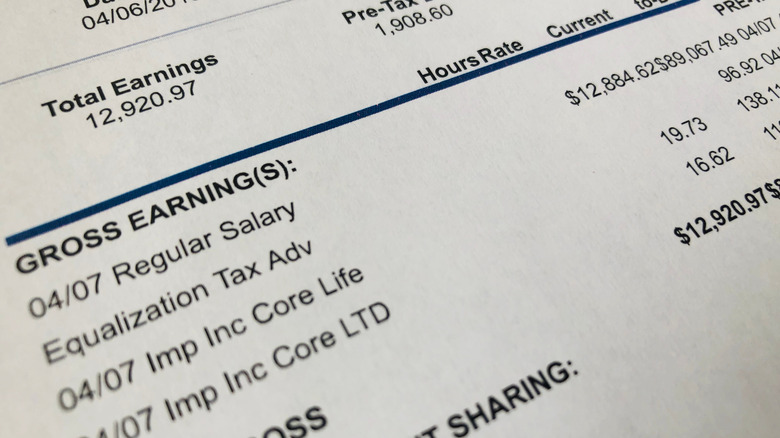The Pay Stub You Should Never Throw Out For Financial Security
There are lots of financial documents that smart consumers would be wise to hold on to. The IRS suggests keeping tax return information as well as other financial documents that relates to your filings for three years in most situations but up to seven or even indefinitely depending on your circumstances. This is an important consideration to make in order to avoid potential problems if you are audited by the government (most IRS audits can go back three years, but a longer review is possible). One of the most important financial documents you might consider keeping for much longer than the rest involves your paycheck.
Naturally, documents like your birth certificate and Social Security card should never be thrown away (although laminating your card to preserve it is also a bad idea) and routine pay stubs fall somewhere in between these lifetime keepers and disposable documents like your paid electricity bills or Spotify subscription receipt. Pay stubs are a good piece of personal information to keep on hand, since they prove important details about where you work and the pay you receive. However, one pay stub in particular stands as more important than the rest. These are the year-end summary documents, and they contain far more valuable information than any other pay stub you'll receive throughout the year.
Yearend pay stubs are a particularly valuable document for workers
Documentation about your salary that is delivered at the end of the year — in the form of a yearend pay stub, not the W-2 you'll get early in the following year — is particularly important. Your year-end pay stub document is full of information about your workplace as well as the gross salary you've earned throughout the calendar year. A W-2, on the other hand is an accounting of just your taxable income. Once you file your taxes, your W-2 becomes a bit less useful while documentation of the gross salary value remains an important resource.
Details about your retirement contributions and other pre-tax deductions get lost in the shuffle when focusing only on your tax preparation documents. Therefore, if you are looking to prove the actual salary you receive in pursuit of a mortgage loan or some other financial need, a year-end pay stub is the most important resource you'll have at your disposal. Perhaps more importantly, businesses close their doors all the time. More than 50% of small businesses fail within their first five years in operation, and when they go under so too do the records that would have been kept in the office. By keeping your year-end pay documentation, you'll preserve a record of all the money you were paid in a calendar year, which can be vitally important if the business you worked at closes its doors and can no longer provide additional copies later on.
Keeping a few other financial records gives you proof when you need it
In addition to year-end pay stubs, it's a good idea to keep a variety of other financial papers. Keeping prior tax returns from the last three to seven years will help you make sense of any IRS liabilities that may arise. It's also a good idea to keep bank statements and credit card bills for up to one year. This allows you to explore your month-to-month spending habits over the course of a relatively long timeline, supporting solid budgeting habits in the process. This also gives you a long enough window of the documentation to quickly dispense with just about any necessary verification of residency that might come into play for you or your family.
You'll also want to maintain documentation for up to seven years for anything that relates to your tax deductions or liabilities beyond the basics. These include receipts for major donations or gifts that were used in an itemized deduction calculation as well as medical bills paid through an FSA or HSA spending account. The reality is that most of your financial documents aren't all that important, but if you hold onto a few key resources relating to your tax status you can easily clear up any potential sticking points that may arise when dealing with the IRS. But holding on to your yearend pay stubs delivers a different kind of financial proof. It will give you a record of your total earnings for the year and support any claims you may have about where you spent your time working.


